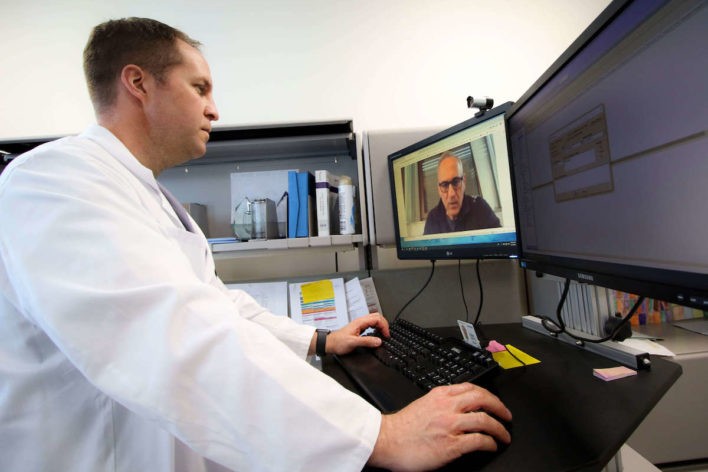Telemedicine Benefits for Military and Veterans

Telemedicine for Military Communities
Telemedicine is the use of technology to communicate about health, often without having to leave home or visit a healthcare facility. The words telemedicine, telehealth, and virtual medicine are often used interchangeably.
Telemedicine protects patients and healthcare providers by limiting person-to-person contact. When you can’t meet with your healthcare team in person, telemedicine offers an alternative.
Telemedicine has existed for many decades and has become more popular with the widespread use of phones, cell phones, and other mobile devices. Some examples of telemedicine include:
- Secure information sharing allows healthcare providers to share sensitive patient information, such as lab results, X-ray images, or health records, with other members of the healthcare team while protecting patient confidentiality.
- Remote monitoring is a form of telemedicine that allows healthcare providers to monitor health data – such as continuous blood glucose monitoring or cardiac monitoring.
- Electronic prescriptions can be sent directly to pharmacies, eliminating the need to worry about losing a paper prescription or writing it in messy handwriting.
TRICARE Telemedicine Expansions
TRICARE encourages the use of telemedicine through secure videoconferencing. You may need authorization or referral for these services. Covered telemedicine services include:
- Office visits
- Preventive health screenings
- Mental health services
Telemedicine services may require secure videoconferencing with audio and video. The cost of phone calls or text messaging is not included in these benefits.
According to the TRICARE official site, “Contact your regional contractor to see if you need a referral or pre-authorization. Active duty service members must have a referral for telemental health care.”
If you use TRICARE For Life, “Medicare should cover your telemedicine visits” including “audio-only telemedicine visits.” In cases where telemedicine visits are not an option through Medicare, “TRICARE For Life is the first payer.”
TRICARE also covers telehealth care “for applied behavior analysis parent or caregiver guidance services under the Autism Care Demonstration.”
Innovative Telemedicine through the VA
Since early 2018, the VA has provided secure telehealth services to veterans through VA Telehealth and the VA Video Connect app. VA Telehealth is a secure videoconferencing app explicitly designed to connect veterans to their healthcare providers from a computer or smartphone.
Additional VA Telemedicine Innovations
Annie, an app that sends automated text messages, supports Veterans in playing an active role in their own healthcare. Through automated text messages, Annie empowers Veterans and provides them with automated self-care reminders.
“Messages you receive from Annie can include reminders to take your medication, tips for reducing stress, instructions to prepare for your health care appointments, and more. Annie can also send general broadcast messages from your VA medical center or on topics of interest to you,” according to the official site.
MyHealtheVet is a secure website that allows servicemembers, Veterans, their caregivers, and families to play an active role in their healthcare. Your MyHealtheVet account gives you access to your health record, allows you to send secure messages to healthcare providers, refill and track prescriptions, and schedule appointments with the VA.
Using the VA appointments tool through your MyHealtheVet, you can request a telehealth appointment or reschedule an existing appointment as a telehealth appointment.
Tips for Telemedicine with Your Healthcare Provider
According to MyHealtheVet, several things can be done to have a successful healthcare visit using VA Video Connect.
Be prepared. Videoconferencing requires visual and auditory capabilities. Will you be able to see and hear your healthcare provider? Will they be able to hear and see you?
- Use headphones to improve sound quality.
- Prevent any background noises – Turn your TV and radio off.
- Find a well-lit place and position your camera so your healthcare provider can see you. Holding your smartphone may not provide the best image.
Related: Suicide Prevention Resources For Military & Veterans
About the author
Julie Provost is a freelance writer, and blogger. She lives in Tennessee with her National Guard husband and three boys.


